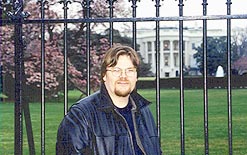"All that is old and already formed can continue to live only if it allows within itself the conditions of a new beginning."
Total Information Awareness Lives On
Posted 5:12 p.m., May 15, 2006
|
• Kevblog Update: ABC News investigative reporters Brian Ross and Richard Esposito reveal a senior federal law enforcement source has told them that their phone calls are being tracked in an effort "to root out confidential sources."
There has been very little attention paid to what strikes me as the real story behind Thursday's revelation that the National Security Agency is tracking billions of phone logs on tens of millions of Americans—and that it ultimately means to collect all Americans' phone records.
Tracking the phone logs of American citizens—-with the apparently willing assistance of private telcos—-is merely a small part of the ongoing surveillance of U.S. citizens that has been taking place for the past five years. However, with the phone revelations, we have tangible evidence that the sweeping, though discredited—-and supposedly halted—-Total Information Awareness (TIA) surveillance program is very much alive and kicking.
(The image included here, incredibly, would have been the project's actual logo.)
So what's TIA? It was meant to be a massive federal surveillance program of U.S. citizens so profound in its dystopian implications that Congress abolished it more than two years ago by yanking its funds.
Or so they thought.
"Research under the Defense Department's Total Information Awareness program—which developed technologies to predict terrorist attacks by mining government databases and the personal records of people in the United States—was moved from the Pentagon's research-and-development agency to another group, which builds technologies primarily for the National Security Agency, according to documents obtained by National Journal and to intelligence sources familiar with the move. … [The program's] funding remained intact, often under the same contracts."
--"TIA Lives On,"
Shane Harris
The National Journal
April 26, 2006Oops.
To repeat: More than two years ago, when nearly anything done in the name of the war on terror was deemed fine by a U.S. Congress that had all but abandoned its oversight duties, lawmakers barred this program. They were under intense pressure at the time from privacy advocates who complained TIA would lead to Orwellian mass surveillance.
As it would have—and now, probably has. TIA was pitched to lawmakers as a virtually limitless program of domestic surveillance, devised under the guidance of an Iran-Contra scandal figure, former Navy Vice Admiral John Poindexter. According to the Electronic Privacy Information Center, this was TIA's stated purpose:
"TIA purported to capture the 'information signature' of people so that the government could track potential terrorists and criminals involved in 'low-intensity/low-density' forms of warfare and crime. The goal was to track individuals through collecting as much information about them as possible and using computer algorithms and human analysis to detect potential activity."
--Electronic Privacy Information Center
Are you catching this? TIA is intended to detect potential activity.And it was not just about terrorism, but also crime. So maybe you've been resting easy since the phone revelations came out, because you know full well you're no terrorist and you're not about to become one. But is it possible that your personal "information signature" might somehow flag you as a potential tax-evader, a potential child molester, or even a potential political subversive (not a crime currently, true, but it has been at various points in American history—and these digital profiles aren’t going anywhere, so if the laws happen to change, well …).
How can we know? How can we even know the data on us is clean, and error-free? Credit reports are notoriously rife with errors. Certainly, the "sophisticated computer profiling" that is done on me by the likes of Amazon.com, which tries to anticipate my next musical purchase based on what I have purchased in the past, generally is wildly off the mark. (No thanks, Amazon, I would not like that Avril Lavigne CD.)
The sort of "Minority Report" preemptive crime-stopping described by TIA advocates would be accomplished, in part, using "predictive modeling," a technology term of art that describes the use of sophisticated computer software to analyze and predict people's behavior. Predictive modeling often is used to detect insurance fraud, for example. (And, using less sophisticated algorithms, by Amazon.com.)
Mining phone records, then, is less than the tip of the iceberg—phone logs being a small part of any individual's overall "information signature." Collecting them is a simple case of capturing structured data—e-mail headers are another example of structured data—to detect trends, such as whom you might be likely to call in the future. That’s important, from a surveillance point of view, but it's hardly enough to build a case on. The total picture would require many other data elements from what TIA's advocates referred to as a "virtual, centralized, grand database."
According to William M. Arkin, a national security columnist at the Washington Post, a lot more than phone information is indeed being collected. He reports that there currently are "500 software tools, databases, data mining and processing efforts contracted for, under development or in use at the NSA and other intelligence agencies today." And many of these programs work to analyze unstructured information—such as the contents of your phone call, or your email, or your digital-cable television viewing habits—all of which can easily be captured, analyzed and used to keep your profile up to date. (Are they being so used? We just don't know.)
Bring all these thousands of disparate data elements together, and you have Total Information Awareness.
And with TIA, what you have is a pervasive surveillance culture—a culture where we are all suspects. In that sense, it can be argued, we are all "subjects of interest" in the war on terror. Otherwise, what's the point in compiling all this information on all of us?
Again, Congress banned TIA by taking away its funding. But they left an unfortunate loophole. According to MIT's Technology Review from April 26, 2006, legislators wrote a "classified annex" to the bill barring the program that preserved funding for its component parts, just so long as they were transferred to a different agency and the technologies were limited to military use and for foreign intelligence purposes—a directive that the Bush administration seems perfectly comfortable interpreting, shall we say, aggressively.
So, if the various reports are right, the project was simply moved from the Defense Advanced Research Projects Agency (DARPA, the birthplace of the Internet) to the National Security Agency's research center. Mission accomplished. Let the money flow. And let the spying commence.
The ChoicePoint Factor
When it was still a subject of public debate, one of TIA's primary prongs was the development of data-mining tools that would sort through massive piles of Americans' personal data to detect and interpret associations and patterns. The government would do this by combining its own intelligence gathering assets with data-mining operations run by private companies.
Among those firms is ChoicePoint, an Alpharetta, Ga.-based company that compiles and provides information on claims histories, motor vehicle records, police records, credit information, drug-testing programs, divorces, voting registration history, you name it. There are reports that they even want to build a DNA database on every American citizen.
In a revelation that made not the slightest ripple in the mainstream press, the National Journal last November revealed that the Defense Department and the FBI had, for the past three years, been paying ChoicePoint for access to its vast treasure trove of personal records on citizens and non-citizens alike.
Leaving aside that the FBI is not supposed to obtain that kind of information without a court-issued warrant, none of this would necessarily be alarming, considering that what ChoicePoint generally gathers are simply public records. But, after obtaining documents through a Freedom of Information Act request, the National Journal revealed that the government has contracted with the company for a secret, exclusive service available only to intelligence agencies.
"Although much of the description of the system has been redacted from the documents—on the grounds that it would reveal law enforcement tactics and operations—the portions that were released indicate that ChoicePoint's work involves continuously tracking a 'subject of interest' and notifying the government when new information has surfaced on that person."
--"The Private Spy Among Us,"
Shane Harris
The National Journal
Nov. 5, 2005That's rather a different shade of beast. After all, it is nowhere defined what exactly makes someone a "subject of interest." Might I become one, for instance, simply for writing this column? Probably not. I'd hope to hell not. But who among us can say "definitely not"? At a minimum, we can be assured, that this article, upon its publication will become part of the "unstructured" portion of my "information signature."
Perhaps you have faith that the government would never do anything to harm or spy on its own citizens. I admire your sense of trust. But in response I have just four words: Project Minaret and Project Shamrock.
If that's not enough to shake your leaves, then maybe this will: Technology is not infallible. It can make mistakes, and certainly the people who analyze technology's output make mistakes.
Consider this: ChoicePoint, the corporation that has garnered billions of dollars in contracts from the federal government in connection to these surveillance programs, is the same company hired by former Florida Secretary of State Katherine Harris to mine through public records to determine how many felons were on the voter registration rolls in 2000. Felons, after all, aren't allowed to vote in Florida.
ChoicePoint's databases identified 94,000 such felons, whom Harris promptly removed from the list of qualified voters. It was later revealed that perhaps 70,000 of the names purged from the voting rolls—roughly 74 percent of those ChoicePoint identified as felons—had come across as "false positives," meaning they had been wrongfully removed from the voter registration rolls and barred from voting in the 2000 election. (Most, incidentally, were minorities and would have tended to vote for the Gore-Lieberman ticket.)
Do you really want to stake your liberty on that kind of technological track record?
-- Kevin Featherly
|
Visit the Kevblog archive.
Copyright 2004, by Kevin Featherly


